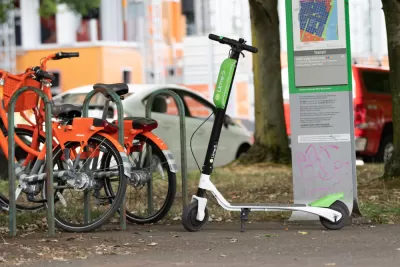We keep having one-off, divisive debates about bikes and scooters. But the real issue is how to accommodate "intermediate modes" (vehicles that go 10-15 mph for a mile or two) in a system that's not designed for them.

Everybody either loves or hates bikes or scooters. But these one-off debates aren't doing any good. In this blog from the Kinder Institute's Urban Edge, urbanist Bill Fulton says the real question is how to accommodate what he calls "intermediate modes" -- vehicles that go 10-15 mph, that people use for a mile or two in dense urban areas. There's clearly a need to provide rights-of-way for such vehicles -- but we've created a binary system that accommodates cars and (to a lesser extent) pedestrians without making any room for this "third way" of urban transportation.
FULL STORY: The urban debate involving scooters, bikes, pedestrians and cars needs to be reframed

Alabama: Trump Terminates Settlements for Black Communities Harmed By Raw Sewage
Trump deemed the landmark civil rights agreement “illegal DEI and environmental justice policy.”

Study: Maui’s Plan to Convert Vacation Rentals to Long-Term Housing Could Cause Nearly $1 Billion Economic Loss
The plan would reduce visitor accommodation by 25% resulting in 1,900 jobs lost.

Why Should We Subsidize Public Transportation?
Many public transit agencies face financial stress due to rising costs, declining fare revenue, and declining subsidies. Transit advocates must provide a strong business case for increasing public transit funding.

Paris Bike Boom Leads to Steep Drop in Air Pollution
The French city’s air quality has improved dramatically in the past 20 years, coinciding with a growth in cycling.

Why Housing Costs More to Build in California Than in Texas
Hard costs like labor and materials combined with ‘soft’ costs such as permitting make building in the San Francisco Bay Area almost three times as costly as in Texas cities.

San Diego County Sees a Rise in Urban Coyotes
San Diego County experiences a rise in urban coyotes, as sightings become prevalent throughout its urban neighbourhoods and surrounding areas.
Urban Design for Planners 1: Software Tools
This six-course series explores essential urban design concepts using open source software and equips planners with the tools they need to participate fully in the urban design process.
Planning for Universal Design
Learn the tools for implementing Universal Design in planning regulations.
Smith Gee Studio
Alamo Area Metropolitan Planning Organization
City of Santa Clarita
Institute for Housing and Urban Development Studies (IHS)
City of Grandview
Harvard GSD Executive Education
Toledo-Lucas County Plan Commissions
Salt Lake City
NYU Wagner Graduate School of Public Service


























